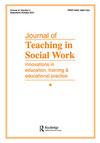金融化和系统性收入不平等:对社会工作教育者和从业人员的行动呼吁
IF 0.8
Q3 EDUCATION & EDUCATIONAL RESEARCH
引用次数: 0
摘要
摘要向金融化经济的转型对工人和消费者产生了毁灭性的影响,加剧了美国和世界各地的财富和收入不平等。在这篇文章中,作者解释了金融化,这是一种双重经济战略,即单个公司投资于金融市场,而不是进行资本改善,以赚取利润,全球和国内经济大量投资并依赖金融、保险和房地产(FIRE)企业。如果社会工作专业要履行促进社会和经济正义的义务,从业者和学生必须了解这一经济战略及其后果。社会工作教育、实践和政策文献阐述了从业者在帮助客户实现金融素养方面可以发挥的作用。这在很大程度上反映了对金融化造成和维持的问题采取微观方法。然而,需要宏观干预,因为金融化表明并加剧了系统性经济不平等。因此,作者确定了多面手和基础实践、政策、领域和继续教育课程的建议内容,这些课程确定了帮助客户解决经济困难所需的知识和技能,并挑战了促成他们的潜在经济力量。本文章由计算机程序翻译,如有差异,请以英文原文为准。
Financialization and Systemic Income Inequality: A Call to Action for Social Work Educators and Practitioners
ABSTRACT The transition to a financialized economy has had a devastating impact on workers and consumers and exacerbated wealth and income inequality in the United States and around the world. In this article, the authors explain financialization, a two-fold economic strategy whereby individual corporations invest in the financial market- rather than make capital improvements- to earn a profit and global and domestic economies heavily invest in and depend upon financial, insurance, and real estate (FIRE) ventures. If the social work profession is to meet its obligation to promote social and economic justice, practitioners and students must understand this economic strategy and its consequences. The social work education, practice, and policy literature elaborates upon the role that practitioners can play in helping clients achieve financial literacy. This reflects a largely micro approach to the problems created and maintained by financialization. Macro interventions are required, however, since financialization is indicative of and exacerbates systemic economic inequality. Therefore, the authors identify suggested content for the generalist and foundation practice, policy, field, and continuing education curricula that identifies the knowledge and skills needed to help clients with their financial difficulties and challenges the underlying economic forces that contributed to them.
求助全文
通过发布文献求助,成功后即可免费获取论文全文。
去求助
来源期刊

Journal of Teaching in Social Work
EDUCATION & EDUCATIONAL RESEARCH-
CiteScore
1.20
自引率
0.00%
发文量
36
期刊介绍:
The Journal of Teaching in Social Work fills a long-standing gap in the social work literature by providing opportunities for creative and able teachers—in schools, agency-based training programs, and direct practice—to share with their colleagues what experience and systematic study has taught them about successful teaching. Through articles focusing on the teacher, the teaching process, and new contexts of teaching, the journal is an essential forum for teaching and learning processes and the factors affecting their quality. The journal recognizes that all social work practitioners who wish to teach (whatever their specialty) should know the philosophies of teaching and learning as well as educational methods and techniques.
 求助内容:
求助内容: 应助结果提醒方式:
应助结果提醒方式:


